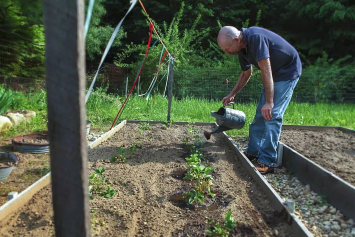Protect Against Heat Stroke
Tips to help you stay safe in the summer heat
 Our planet is experiencing extreme bouts of heat, with higher-than-average temperatures and humidity. It’s more important than ever to understand the risks and warning signs of heat related illnesses. We have tips to help you protect yourself and others from extreme heat.
Our planet is experiencing extreme bouts of heat, with higher-than-average temperatures and humidity. It’s more important than ever to understand the risks and warning signs of heat related illnesses. We have tips to help you protect yourself and others from extreme heat.
Who’s at risk
Extreme heat can be dangerous for anyone. But it can be especially dangerous for those with chronic medical conditions. Other risk factors include access to air conditioning, age, alcohol use, and dehydration. Prescription medications can also affect your body’s ability to control its temperature.
Ask your healthcare team if you should take any special precautions in the heat.
Warning signs
Heat-related illnesses, like heatstroke, happen when the body can't cool itself. This can cause damage to the brain and other vital organs. Learn to recognize the symptoms of heatstroke:
- An extremely high body temperature (above 103°F)
- Confusion
- Dizziness
- Nausea
- Red, hot, and dry skin (no sweating)
- Rapid, strong pulse
- Throbbing headache
- Unconsciousness
If you think someone is experiencing heatstroke, call 911 right away. Then move the person to a shady area. Cool their body if possible. For example, place them in a tub of cool water or spray them with cool water from a garden hose. If the humidity is low, wrap them in a cool, wet sheet and fan them vigorously. Continue until their body temperature drops below 102°F or medical help arrives.
Learn the warning signs of other heat related illnesses.
Ways to stay safe
When you're in extreme heat, especially for a long time, it can affect both your mental and physical health. Follow these tips to stay safe:
- Avoid high-intensity exercises until you've adjusted to the heat.
- Avoid peak heat, humidity, and pollution. These are usually most intense during midday.
- Drink plenty of water in small amounts at a time to stay hydrated.
- Seek shady areas, such as tree-lined trails and parks, to stay cooler when it’s hot.
- Use sunscreen to protect your skin and wear light-colored, loose clothing and a hat.
- Wear loose moisture wicking clothes that can remove sweat and keep your body cooler.
- Wear proper fitting shoes with moisture wicking socks.
How VA can help
Heatstroke is just one danger of extreme heat. Talk to your health care team about how heat may be affecting your health and what changes you can make to stay safe. Send them a Secure Message to start a conversation about your health.
You may have concerns about safe housing or access to air conditioning. VA social workers can connect you to a variety of helpful resources and services. Call your local VA and ask to meet with a social worker. Whatever your situation, they’ll work with you to create an action plan and connect you to the care or support you need.
Please vote in our unscientific poll. All responses are anonymous.
Read more
Extreme Heat: How to Stay Cool, Hydrated, and Informed (VA News)
Dehydration (Veterans Health Library)
Created on August 16, 2023

